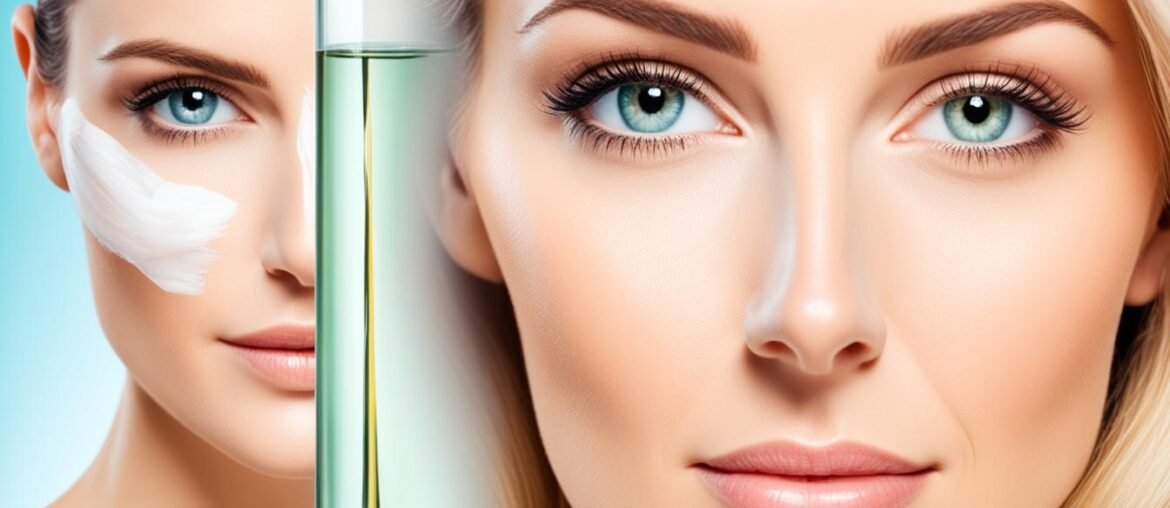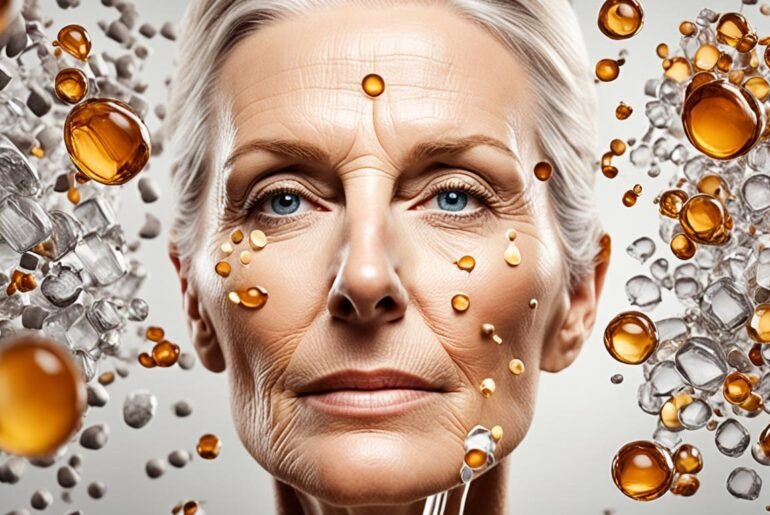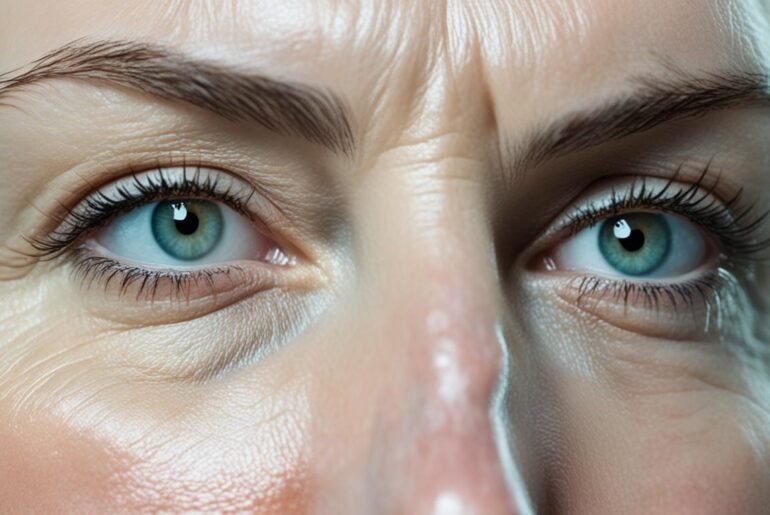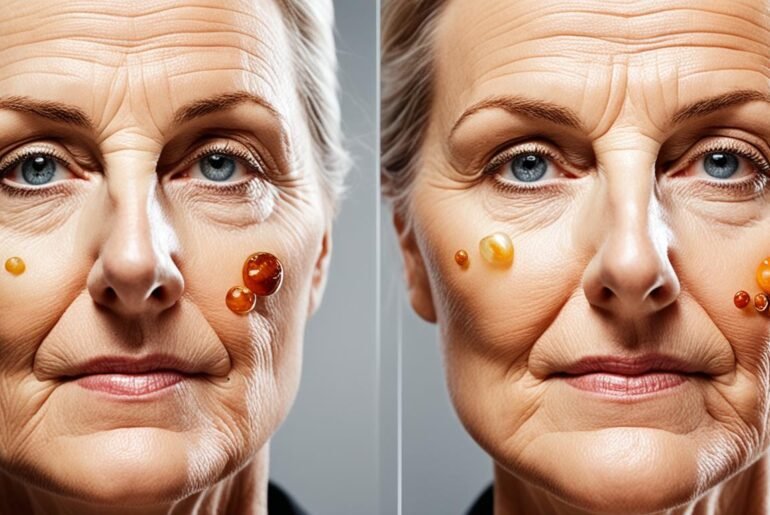Did you know that alcohol consumption can have a significant impact on the youthfulness and health of your skin? It may come as a surprise, but studies have shown that alcohol can contribute to the signs of facial aging, including wrinkles, sagging skin, and volume loss.
But how exactly does alcohol affect our skin? Let’s explore the risk factors and effects of alcohol on our skin, as well as the steps we can take to maintain a youthful appearance and skin health.
Key Takeaways:
- Excessive alcohol consumption can lead to skin damage, premature aging, and a decline in skin health.
- Alcohol can cause dehydration, collagen depletion, dullness, acne breakouts, blood vessel dilation, and other harmful effects on the skin.
- Practicing moderation in alcohol consumption and adopting a healthy lifestyle are crucial for preserving youthful skin appearance.
- Other factors, such as stress, smoking, poor nutrition, lack of sleep, and sun exposure, can also contribute to premature skin aging.
- By prioritizing skin health and taking preventive measures, we can mitigate the negative effects of alcohol on our appearance and maintain a youthful glow.
The Role of Alcohol in Skin Aging
Excessive alcohol consumption can have significant effects on the aging process of the skin. The skin is the body’s largest organ, and its health and appearance are influenced by various factors, including alcohol consumption. Alcohol-induced skin damage can manifest in different ways, including collagen depletion, dehydration, blood vessel dilation, and premature aging.
Collagen Depletion: Decreased Elasticity and Wrinkles
Alcohol depletes essential vitamins, especially vitamin A, necessary for collagen production. Collagen is a protein that provides structure and elasticity to the skin. When alcohol lowers collagen levels, it leads to a loss of skin elasticity and the formation of wrinkles. Over time, the cumulative effects of collagen depletion contribute to an aged appearance.
Dehydration: Skin Dryness and Sagging
Alcohol is a diuretic, causing increased urine production and subsequent dehydration. Dehydration affects the skin’s moisture levels, leading to dryness, tightness, and sagging. Additionally, alcohol impairs the skin’s ability to retain moisture, exacerbating the signs of skin aging.
Blood Vessel Dilation: Redness and Spider Veins
Alcohol widens blood vessels, resulting in skin redness and flushing. Prolonged alcohol consumption can lead to the development of spider veins, which are tiny blood vessels visible on the skin’s surface. These vascular issues contribute to an aged appearance and can be challenging to reverse.
Premature Aging: Wrinkles, Age Spots, and Dullness
The combination of collagen depletion, dehydration, and blood vessel dilation caused by alcohol consumption accelerates the overall aging process of the skin. This premature aging manifests in the form of wrinkles, age spots, and a dull complexion. The effects are particularly noticeable in individuals who consume alcohol excessively and over prolonged periods.
It is crucial to recognize the impact of alcohol on skin health and take steps to mitigate its negative effects. Adopting a moderate approach to alcohol consumption and maintaining a healthy lifestyle that includes proper hydration, nutrition, and skincare can help preserve skin youthfulness and delay the signs of aging.
Alcohol and Skin Disorders
Alcohol consumption can have detrimental effects on skin health, exacerbating or triggering various skin disorders. One of the immediate impacts of alcohol is flushing, which is characterized by redness and warmth in the face, neck, and chest. Alcohol-induced flushing can be particularly problematic for individuals with rosacea, a chronic inflammatory skin condition that causes facial redness, visible blood vessels, and small, pus-filled bumps.
Rosacea patients often experience heightened sensitivity to alcohol, leading to increased facial redness and exacerbation of other symptoms. Similarly, individuals with psoriasis, a chronic autoimmune disease that causes itchy and scaly patches on the skin, may find that alcohol consumption worsens their condition. Alcohol’s inflammatory properties can trigger psoriasis flare-ups and lead to more severe symptoms.
Additionally, alcohol can negatively impact individuals with seborrheic dermatitis, a common skin condition characterized by red and scaly patches on the scalp, face, and other oily areas. Alcohol’s drying effect can worsen seborrheic dermatitis symptoms, causing more severe itching and irritation.
Sunburn susceptibility is also a concern for those who consume excessive amounts of alcohol. Alcohol can increase sensitivity to ultraviolet (UV) radiation, making the skin more prone to sunburn. This heightened susceptibility to sunburn can lead to the development of sun-induced skin damage, such as premature wrinkling, discoloration, and an increased risk of skin cancer.
Furthermore, alcohol’s impact on the immune system can exacerbate autoimmune skin conditions, such as lupus erythematosus. By compromising the immune response, alcohol consumption can worsen the symptoms of these conditions, further contributing to skin disorders and premature aging.
To better understand the relationship between alcohol consumption and skin disorders, refer to the table below:
| Skin Disorder | Effect of Alcohol |
|---|---|
| Rosacea | Increased flushing and facial redness |
| Psoriasis | Worsened symptoms and increased inflammation |
| Seborrheic Dermatitis | Exacerbation of itching and irritation |
| Sunburn Susceptibility | Heightened sensitivity to UV radiation |
| Autoimmune Skin Disorders | Aggravation of symptoms |
It is important to note that the severity of these effects may vary among individuals, and some individuals may be more sensitive to alcohol’s impact on the skin. Therefore, it is advisable to be mindful of alcohol consumption to maintain optimal skin health.
Dehydration and Skin Health
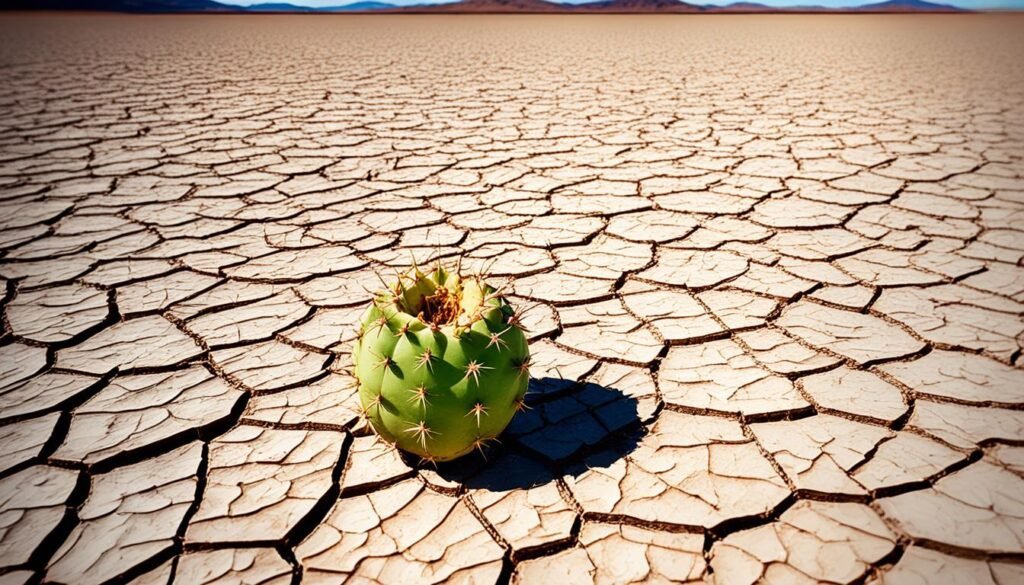
Alcohol consumption can have a significant impact on skin health and youthfulness due to its dehydrating effects. When we consume alcohol, it interferes with the body’s natural hydration process, leading to dehydration. This dehydration not only affects our overall well-being but also has negative consequences for our skin.
Dehydration reduces the availability of water to skin cells, which directly affects their ability to function optimally. As a result, the skin becomes dry, lacking the moisture it needs to stay hydrated and supple. Dryness can lead to a variety of problems, including increased wrinkles, fine lines, and sagging skin.
Furthermore, dehydration compromises the skin’s barrier function, making it more susceptible to external aggressors such as pollution and UV rays. When the skin’s barrier is compromised, it becomes less effective at retaining moisture, further exacerbating the issue of dryness and contributing to premature aging.
“Alcohol consumption can disrupt the body’s water balance and hinder the skin’s ability to retain moisture, leading to dryness and accelerated aging.”
Proper hydration is crucial for maintaining healthy and youthful-looking skin. By ensuring that we drink enough water and limiting alcohol consumption, we can help our skin stay hydrated from within. Additionally, using moisturizers and emollients can aid in replenishing lost moisture and strengthening the skin’s barrier function.
Collagen Depletion and Skin Aging
Alcohol consumption can have a significant impact on the depletion of collagen in the skin, leading to the formation of wrinkles, sagging skin, and an overall older appearance. Collagen plays a crucial role in maintaining the skin’s structure and elasticity, and its depletion caused by alcohol disrupts the skin’s natural collagen synthesis process, contributing to premature aging.
Alcohol’s effects on collagen are multifaceted. Firstly, it impairs the production of collagen, reducing the skin’s ability to renew and repair itself. Secondly, it hinders the formation of new collagen fibers, which are essential for maintaining skin firmness and elasticity. The combination of reduced collagen production and impaired collagen formation results in noticeable signs of aging, such as wrinkles and sagging skin.
The effects of alcohol on collagen can be further exacerbated by other factors, such as dehydration and oxidative stress. Alcohol consumption dehydrates the skin, leading to decreased collagen hydration and further accelerating the aging process. Additionally, alcohol’s impact on the body’s antioxidant defense system disrupts collagen synthesis, contributing to collagen degradation and an overall aging appearance.
To better understand the effects of alcohol on collagen depletion, consider the following table:
| Effects of Alcohol on Collagen Depletion | Consequence on Skin |
|---|---|
| Reduces collagen production | Increases the appearance of wrinkles |
| Impairs collagen formation | Accentuates sagging skin |
| Dehydrates the skin | Exacerbates collagen breakdown |
| Disrupts antioxidant defense system | Accelerates collagen degradation |
It is important to note that collagen depletion caused by alcohol consumption is not reversible. Therefore, practicing moderation in alcohol consumption or abstaining altogether can help minimize collagen depletion and preserve skin youthfulness.
Blood Vessel Dilation and Skin Redness
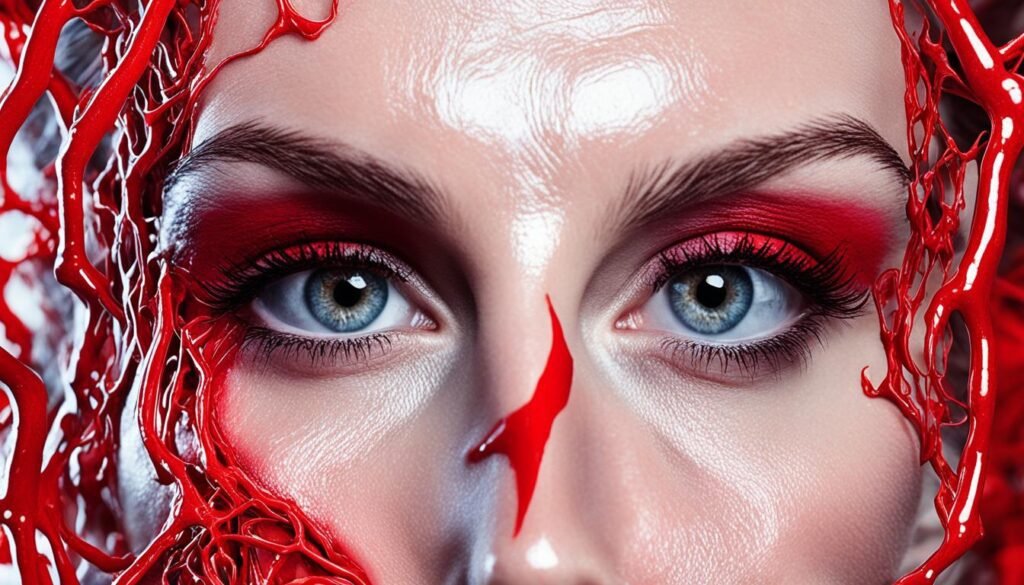
Alcohol consumption can have significant effects on blood vessels, leading to redness, flushing, and the appearance of spider veins. When alcohol is ingested, it impacts the body’s circulatory system, causing blood vessels to dilate. This dilation is responsible for the visible redness and flushing of the skin that many individuals experience after consuming alcohol.
The expansion of blood vessels can be long-lasting and contribute to an aged appearance. The dilated blood vessels can also result in the development of spider veins, which are small, visible blood vessels that appear close to the surface of the skin, resembling spider webs.
Excessive and continued alcohol consumption can further exacerbate these vascular issues, leading to more pronounced redness, flushing, and spider veins. It is important to note that the effects of alcohol on blood vessels vary among individuals, with some being more susceptible to these visible changes.
Acne Breakouts and Alcohol Consumption
Excessive alcohol consumption can have a direct impact on the development of acne breakouts. One of the key effects of alcohol on the skin is its ability to increase the production of sebum, the natural oil that lubricates and protects the skin.
The excessive production of sebum, combined with dead skin cells, dirt, and bacteria, can clog the pores, leading to the formation of acne. Even individuals who are not typically prone to regular breakouts may experience alcohol-induced acne.
“Alcohol can disrupt the delicate balance of sebum production, which can result in the onset or worsening of acne breakouts.”
To prevent and manage alcohol-induced acne, it is essential to maintain a consistent skincare routine that includes cleansing the skin thoroughly, exfoliating to remove dead skin cells, and using non-comedogenic products that do not clog the pores.
The Effects of Alcohol on Skin Sebum
Alcohol disrupts the normal regulation of sebum production, leading to an increase in sebum output from the sebaceous glands. This excess sebum can create an ideal environment for the growth of acne-causing bacteria, resulting in inflammation and the formation of acne lesions.
Preventing Excess Sebum Production
To minimize the effects of alcohol on sebum production and reduce the risk of acne breakouts, it is important to practice moderation in alcohol consumption. Staying hydrated by drinking plenty of water and following a balanced diet can also help maintain proper sebum production and skin health.
| Preventive Measures | Benefits |
|---|---|
| Avoid excessive alcohol consumption | Reduces sebum production and the risk of acne |
| Maintain a consistent skincare routine | Keeps the pores clean and unclogged |
| Stay hydrated | Promotes balanced sebum production |
| Eat a balanced diet | Supports overall skin health |
By being mindful of alcohol consumption and implementing effective preventive measures, individuals can reduce the likelihood of alcohol-induced acne breakouts and promote healthier skin.
Effects of Alcohol on Sleep and Skin Appearance
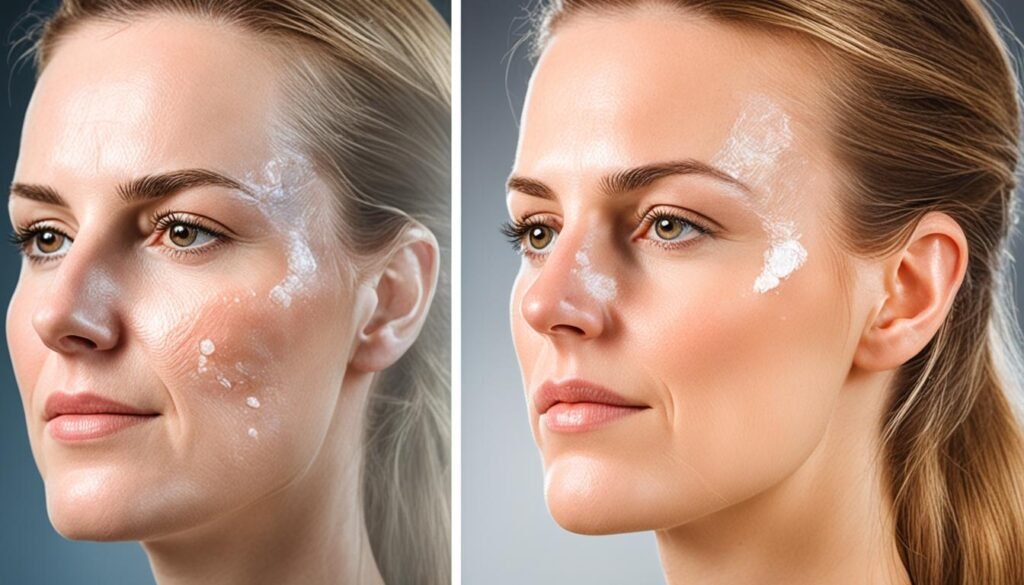
Alcohol consumption can have a significant impact on both sleep quality and skin appearance. Poor sleep is commonly associated with alcohol consumption, which can lead to various negative effects on the skin, including puffy eyes, under-eye bags, and a tired appearance. When we don’t get enough restful sleep, it can contribute to an aged and fatigued look, making individuals appear older than their actual age. It is important to be aware of the effects of alcohol on sleep and take steps to promote proper rest for maintaining a youthful appearance.
One of the ways alcohol affects sleep is by disrupting the normal sleep cycle. It can interfere with the production of certain neurotransmitters that regulate sleep, leading to difficulties in falling asleep and disrupted sleep throughout the night. As a result, individuals may experience fragmented sleep, reduced REM (rapid eye movement) sleep, and an overall decrease in sleep quality.
Moreover, alcohol has a diuretic effect, which means it increases urine production and can lead to dehydration. This can cause nighttime awakenings due to the need to urinate, further interrupting sleep patterns. Dehydration also affects the skin’s appearance, as it reduces moisture levels and can lead to dryness and dullness.
To minimize the negative impact of alcohol on sleep and skin appearance, it is advisable to avoid alcohol consumption close to bedtime. Giving the body adequate time to metabolize and eliminate alcohol can help ensure a better night’s sleep. Additionally, practicing good sleep hygiene, such as maintaining a regular sleep schedule, creating a comfortable sleep environment, and avoiding stimulating activities before bed, can also contribute to improved sleep quality.
| Effects of Alcohol on Sleep and Skin Appearance |
|---|
| Disruption of sleep cycle |
| Fragmented sleep |
| Reduced REM sleep |
| Increased nighttime awakenings |
| Dehydration |
| Dry and dull skin |
By prioritizing quality sleep and avoiding excessive alcohol consumption, individuals can improve their sleep patterns, leading to a more refreshed and youthful appearance. Adequate rest allows the skin to regenerate and repair itself, promoting a healthy and vibrant complexion.
Other Factors Contributing to Premature Skin Aging
Apart from alcohol consumption, there are several other factors that can contribute to premature skin aging. Stress, smoking, poor nutrition, lack of sleep, and excessive sun exposure all play a role in the degradation of skin health and youthfulness.
Stress: Chronic stress can take a toll on your skin. It can trigger inflammation, leading to collagen breakdown, increased oil production, and the development of acne. Managing stress through relaxation techniques and self-care is important for maintaining healthy skin.
Smoking: Smoking is a major contributor to premature skin aging. The toxins in cigarette smoke constrict blood vessels, decrease blood flow, and deplete oxygen and nutrients in the skin. This leads to wrinkles, sagging, and a dull complexion.
Poor Nutrition: A diet lacking in essential nutrients can impair the skin’s ability to repair itself and fight off damage. Nutrient deficiencies can result in dryness, dullness, and a weakened skin barrier, making the skin more susceptible to aging factors.
Lack of Sleep: Getting enough sleep is crucial for skin rejuvenation and repair. During sleep, the body produces collagen, repairs damaged cells, and balances hydration levels. Chronic sleep deprivation can lead to increased inflammation, fine lines, under-eye circles, and a tired-looking complexion.
Sun Exposure: Overexposure to the sun’s harmful UV rays accelerates skin aging. It leads to the breakdown of collagen and elastin fibers, resulting in wrinkles, sunspots, and uneven skin tone. Protecting your skin with sunscreen, seeking shade, and wearing protective clothing is essential for maintaining a youthful appearance.
Aging Factors: As we age, our skin naturally becomes thinner and loses elasticity. The production of collagen and elastin slows down, leading to the formation of wrinkles, fine lines, and sagging skin. While this process is inevitable, adopting a healthy lifestyle and protecting the skin can minimize the visible signs of aging.
When it comes to preventing premature skin aging, it’s important to address these factors in addition to alcohol consumption. By managing stress, quitting smoking, nourishing the body with a balanced diet, getting adequate sleep, protecting skin from the sun, and embracing healthy aging practices, you can maintain youthful, vibrant skin.
Prevention of Premature Aging
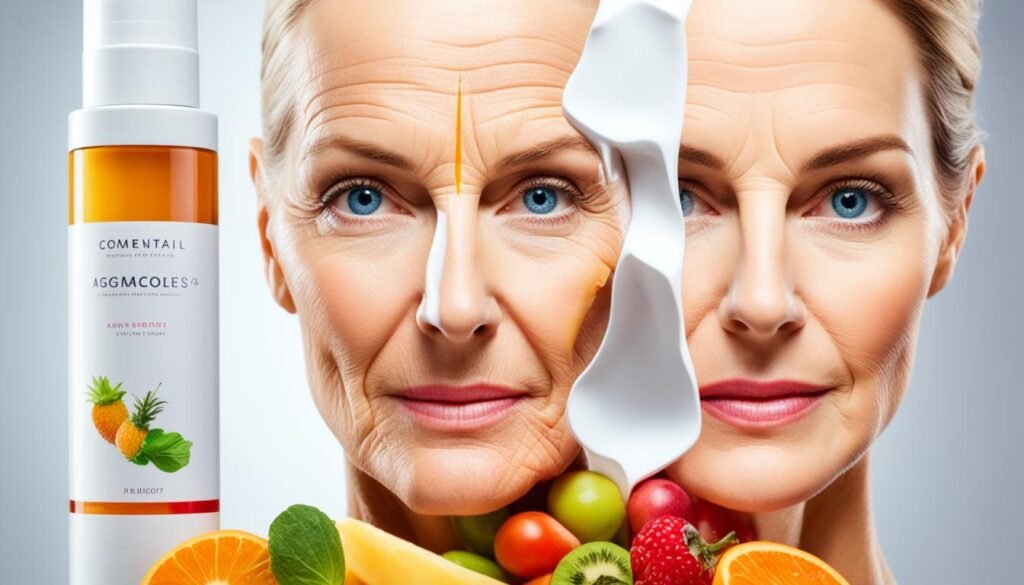
To maintain youthful and healthy skin, it is essential to adopt a holistic approach towards prevention. By incorporating healthy lifestyle habits and avoiding behaviors that contribute to skin damage, you can preserve the natural aging process and maintain a radiant complexion. Here are some key steps to prevent premature aging:
- Practice moderation in alcohol consumption: Alcohol consumption can accelerate the aging process, leading to skin dullness, dehydration, and collagen depletion. Limit your alcohol intake or consider abstaining altogether to protect your skin health and maintain a youthful appearance.
- Stay hydrated: Proper hydration is crucial for keeping your skin plump, supple, and youthful. Drink an adequate amount of water daily to maintain optimal skin hydration and prevent dryness and wrinkles.
- Get enough sleep: Quality sleep is essential for skin rejuvenation and repair. Aim for 7-9 hours of uninterrupted sleep each night to minimize the appearance of puffy eyes, dark circles, and a tired complexion.
- Avoid smoking: Smoking accelerates the aging process and contributes to the development of wrinkles, fine lines, and a dull complexion. Quitting smoking can significantly improve your skin’s health and overall appearance.
- Protect your skin from UV radiation: Overexposure to the sun’s harmful UV rays can lead to premature aging, wrinkles, age spots, and an increased risk of skin cancer. Wear sunscreen with a high SPF, seek shade, and wear protective clothing to shield your skin from the sun.
- Maintain a balanced diet: Nutrient-rich foods, including fruits, vegetables, lean proteins, and healthy fats, provide essential vitamins and antioxidants that promote skin health. Incorporate foods such as berries, leafy greens, salmon, and nuts to nourish your skin from within.
Healthy Lifestyle Habits for Skin Aging Prevention
| Habit | Description |
|---|---|
| Practice moderation in alcohol consumption | Limit alcohol intake or consider abstaining |
| Stay hydrated | Drink an adequate amount of water daily |
| Get enough sleep | Aim for 7-9 hours of quality sleep each night |
| Avoid smoking | Quit smoking to improve skin health |
| Protect your skin from UV radiation | Wear sunscreen, seek shade, and wear protective clothing |
| Maintain a balanced diet | Incorporate nutrient-rich foods into your diet |
By following these healthy lifestyle habits, you can proactively prevent premature aging, maintain skin youthfulness, and enjoy a vibrant and glowing complexion for years to come.
Effects of Alcohol on Internal Aging
Excessive alcohol consumption can have detrimental effects not only on the external appearance of the skin but also on the internal aging process. Alcohol abuse can cause significant damage to vital organs, including the liver, pancreas, and brain, leading to premature aging and an increased risk of age-related illnesses.
The liver is particularly vulnerable to the damaging effects of alcohol. Prolonged and excessive alcohol consumption can result in liver inflammation, scarring (cirrhosis), and damage to liver cells. These liver-related issues can contribute to premature aging and increase the risk of liver cancer and other liver diseases.
The pancreas is another organ that can be adversely affected by alcohol. Alcohol abuse can cause inflammation of the pancreas, known as pancreatitis, which can lead to pancreatic damage and dysfunction. This not only accelerates the aging process but also increases the risk of pancreatic cancer and other pancreatic diseases.
Furthermore, alcohol abuse can cause damage to brain cells and disrupt brain chemistry. Chronic alcohol consumption can result in cognitive impairments, memory problems, and even dementia. These neurological issues can significantly impact the overall well-being and cognitive function of individuals, contributing to premature aging.
It is important to understand that internal aging caused by alcohol abuse can extend beyond the visible signs of aging. The damage to organs and tissues can lead to a higher risk of age-related illnesses, such as cardiovascular diseases, cancer, and neurological disorders. Thus, alcohol’s impact on internal aging must be taken into consideration when assessing its overall effects on one’s well-being and youthful appearance.
Investing in a healthy lifestyle that includes moderation or abstinence from alcohol, along with regular exercise, a balanced diet, and proper medical care, can help mitigate the internal aging effects of alcohol consumption.
| Organ | Effect of Alcohol | Risk of Age-Related Illnesses |
|---|---|---|
| Liver | Liver inflammation, scarring, and cell damage | Liver cancer, cirrhosis, liver diseases |
| Pancreas | Pancreatic inflammation and damage | Pancreatic cancer, pancreatitis, pancreatic diseases |
| Brain | Brain cell damage and disruption of brain chemistry | Cognitive impairments, memory problems, dementia, neurological disorders |
Conclusion
Excessive alcohol consumption poses a significant risk to skin youthfulness and can accelerate the aging process. The detrimental effects of alcohol on the skin, including dehydration, collagen depletion, blood vessel dilation, acne breakouts, and premature aging, can have a lasting impact on one’s appearance and overall skin health. To maintain a youthful glow and preserve skin youthfulness, it is crucial to practice moderation in alcohol consumption and embrace a healthy lifestyle.
By adopting a healthy lifestyle, individuals can mitigate the negative effects of alcohol on their skin. Prioritizing skin health involves taking proactive measures to protect and nourish the skin, such as staying hydrated, following a balanced diet, getting enough sleep, and protecting the skin from harmful UV radiation. These actions not only promote skin youthfulness but also contribute to overall well-being.
It is important to recognize that alcohol consumption is just one contributing factor to premature aging. Other factors, including stress, smoking, poor nutrition, lack of sleep, and excessive sun exposure, can also accelerate the aging process. Therefore, a comprehensive approach that addresses all these factors is necessary for maintaining a youthful appearance and optimal skin health.
By making conscious choices to limit alcohol consumption, adopting a healthy lifestyle, and considering the long-term impact on internal aging, individuals can safeguard their skin’s youthfulness and preserve their natural beauty for years to come.
FAQ
How does alcohol consumption affect the skin?
Alcohol consumption can have detrimental effects on the youthfulness and health of the skin. It can cause dehydration, collagen depletion, dullness, acne breakouts, blood vessel dilation, and premature aging.
The risk factors of alcohol-related skin issues include dehydration, collagen depletion, blood vessel dilation, acne breakouts, and premature aging. Excessive alcohol consumption can also worsen or cause various skin disorders and negatively impact sleep quality.
How does alcohol contribute to premature skin aging?
Excessive alcohol consumption can accelerate the aging process of the skin. It depletes vitamins and collagen, causes dehydration, widens blood vessels, and increases sebum production, resulting in dryness, wrinkles, sagging, and acne breakouts.
Can alcohol consumption lead to skin disorders?
Yes, alcohol consumption can worsen or trigger skin disorders such as flushing, rosacea, psoriasis, seborrhea, and dermatitis. It can also increase sensitivity to the sun, making individuals more susceptible to sunburn.
How does alcohol consumption contribute to skin dehydration?
Alcohol consumption can lead to dehydration, which reduces water availability to skin cells. Dehydration results in dryness, increased wrinkles, and sagging skin.
How does alcohol impact collagen production and skin aging?
Alcohol accelerates the depletion of collagen in the skin, leading to the formation of wrinkles, sagging skin, and an overall older appearance.
What effects does alcohol have on blood vessels and skin redness?
Alcohol causes blood vessels to dilate, resulting in redness, flushing, and the appearance of spider veins.
Can alcohol consumption contribute to acne breakouts?
Yes, excessive alcohol consumption can increase the production of skin oils, known as sebum, which can lead to clogged pores and acne breakouts.
How does alcohol affect sleep quality and skin appearance?
Alcohol consumption can disrupt sleep patterns and lead to poor sleep quality, causing puffy eyes, bags under the eyes, and a generally tired appearance.
What other factors contribute to premature skin aging?
Apart from alcohol consumption, factors such as stress, smoking, poor nutrition, lack of sleep, and excessive sun exposure can contribute to premature skin aging.
How can I prevent premature skin aging caused by alcohol consumption?
To prevent premature skin aging, it is important to practice moderation in alcohol consumption, maintain a healthy lifestyle, and take proactive measures to protect and nourish the skin.
Does excessive alcohol consumption affect internal aging?
Yes, excessive alcohol consumption can damage various organs and contribute to internal aging, including liver damage, pancreas damage, and brain damage.
What is the conclusion regarding alcohol consumption and skin youthfulness?
Excessive alcohol consumption can be a risk to skin youthfulness, as it can lead to dehydration, collagen depletion, blood vessel dilation, acne breakouts, and premature aging. It is important to practice moderation and adopt a healthy lifestyle to prevent premature aging caused by alcohol consumption.

